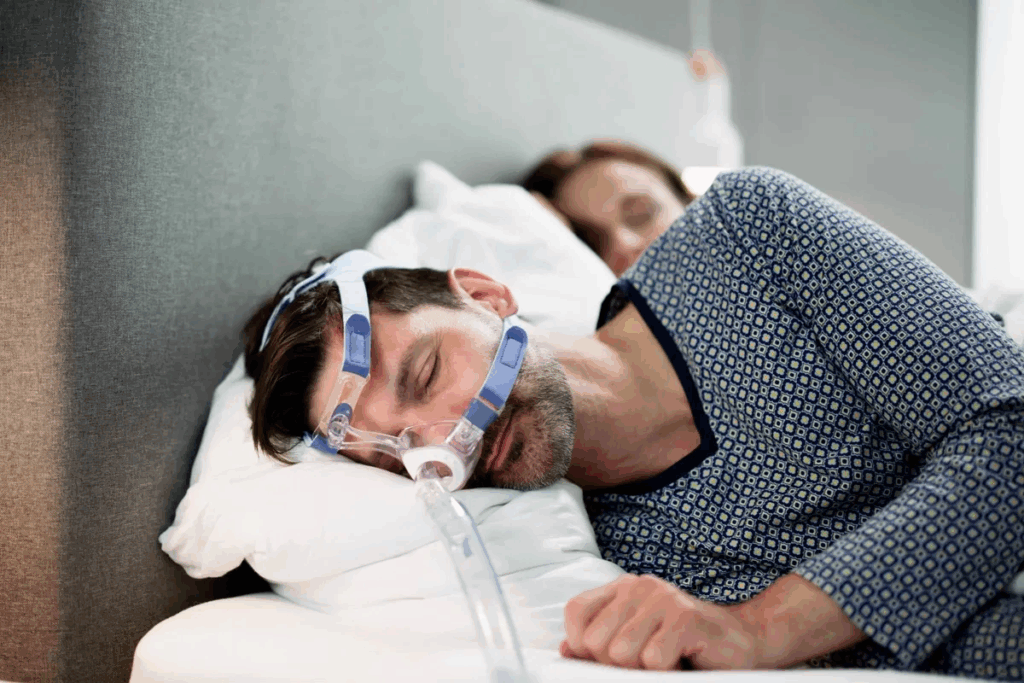Last Updated on November 27, 2025 by Ugurkan Demir

Sleep apnea is a chronic condition that affects millions of people worldwide. Many wonder: does sleep apnea go away? The answer is not simple. While it’s not fully curable, it can be managed and treated effectively.
The Medical organization says sleep apnea is common but can be managed. At Liv Hospital, we focus on a patient-centered approach for sleep apnea. With the right medical care and lifestyle changes, like losing weight, many see big improvements or even no symptoms at all.
Understanding sleep apnea and its management is key for those affected. We’ll look into how to manage sleep apnea well. We’ll also talk about what you can expect from treatment.
Does sleep apnea go away? Learn that it is a chronic condition, but it can be reversed in some cases by weight loss or addressing underlying causes.

Sleep apnea has big health effects and needs our attention. It causes breathing pauses or shallow breaths during sleep. This disrupts sleep and can lead to health problems.
Sleep apnea harms the body in many ways. It causes broken sleep and low blood oxygen. This can make you tired during the day and increase heart disease risk.
Getting diagnosed and treated is very important for your health.
“Sleep apnea is not just a sleep disorder; it’s a condition that can have serious implications for overall health and quality of life.” This quote shows why we must understand sleep apnea to manage its effects.
There are three main types of sleep apnea. Obstructive sleep apnea (OSA) is the most common. It happens when the airway gets blocked.
Central sleep apnea (CSA) is when the brain can’t send signals to breathe. Complex sleep apnea is a mix of OSA and CSA.
Type of Sleep Apnea | Cause | Characteristics |
Obstructive Sleep Apnea (OSA) | Airway blockage | Common, associated with obesity and snoring |
Central Sleep Apnea (CSA) | Brain signal failure | Less common, related to neurological issues |
Complex Sleep Apnea Syndrome | Combination of OSA and CSA | More challenging to diagnose and treat |
Research shows sleep apnea affects nearly 936 million adults aged 30-69 worldwide. It’s more common as people get older. This highlights the need for awareness and effective management.
The global impact of sleep apnea is huge. Many factors contribute to its prevalence. Understanding these factors is key to finding solutions.
“The prevalence of sleep apnea is alarmingly high, stressing the need for broad public health strategies to tackle this issue.”

Knowing if sleep apnea is chronic is key to managing it and improving life quality. Sleep apnea is seen as a chronic issue that often can’t be fully cured in adults. This is because our body’s structure doesn’t change much.
Sleep apnea is a long-lasting problem that needs ongoing care. It causes breathing pauses or shallow breaths during sleep, disrupting normal rest. Studies show it doesn’t go away on its own, mainly after the teenage years, because our body’s structure is stable.
Even though sleep apnea is often seen as chronic, its severity can change. Changes in weight, lifestyle, and treatments can affect how often and how bad sleep apnea episodes are. But, the risk of getting sleep apnea usually stays the same.
Many things can affect if sleep apnea stays the same or gets better. These include:
These factors together decide how sleep apnea will change for someone. Knowing them is key to making a good plan to manage it.
Factor | Impact on Sleep Apnea |
Age | Worsening with age due to decreased muscle tone |
Weight Changes | Significant gain or loss can impact severity |
Lifestyle Modifications | Positive changes can help manage symptoms |
Health Conditions | Presence of other issues can affect sleep apnea |
By understanding sleep apnea’s chronic nature and what affects it, people can manage it better. This can improve their life quality.
It’s important to know if sleep apnea can get better without treatment. Sleep apnea is when you stop breathing or breathe shallowly while sleeping. It’s often seen as a long-term problem, but sometimes symptoms can get better or go away.
Spontaneous resolution means getting better without treatment. Studies show it’s more common in mild sleep apnea. But, it’s not very common overall. It depends on the cause and individual factors.
Factors influencing spontaneous resolution include:
Some risk factors make it less likely for sleep apnea to get better on its own. These include:
Changes in lifestyle or health can sometimes make sleep apnea better without treatment. Losing a lot of weight or quitting smoking can help. But, these changes vary from person to person.
People with sleep apnea should talk to doctors to figure out the best plan. While it’s possible for symptoms to get better, it’s not always the case, and it’s more likely in mild cases.
Studies show that losing weight can greatly reduce sleep apnea symptoms. Obesity is a big reason why people get sleep apnea. It blocks the airway, causing breathing pauses during sleep.
Being overweight is a big risk for sleep apnea. Extra weight, mainly around the neck, can block the airway. Even a little weight loss can make sleep apnea symptoms much better.
“Losing weight is key for managing sleep apnea, says a top sleep expert. “It helps reduce sleep apnea, improving health and life quality.”
Many studies have looked at how weight loss affects sleep apnea. They found that losing weight can make sleep apnea better. For example, a study showed that losing weight cut down on sleep apnea episodes.
The amount of weight loss needed varies. But, losing 5-10% of body weight can make a big difference. Some might need to lose more to see the best results.
Many people have seen big improvements in sleep apnea after losing weight. Studies show that weight loss can greatly reduce sleep apnea. For example, one study found that over 70% of participants saw a big drop in sleep apnea episodes after losing weight.
Understanding how weight loss helps sleep apnea can help manage the condition. Eating healthy and exercising regularly can help lose weight and improve overall health.
When children are diagnosed with sleep apnea, a big question is if they can grow out of it. Sleep apnea in kids is different from what adults experience. It has its own causes and outcomes.
Kids’ sleep apnea is not like adults’. Adults often get it from being overweight or other lifestyle choices. But kids usually get it because of big tonsils or adenoids.
Anatomical differences are key in kids’ sleep apnea. Their airways are smaller and can get blocked easily. Big tonsils or adenoids can make breathing hard while they sleep.
As kids grow, their airways change too. Sometimes, sleep apnea caused by big tonsils or adenoids gets better as they get older. This is because their airway grows and these blockages get smaller.
But, not all kids will outgrow sleep apnea. It depends on why they have it and if they have other health problems.
For many kids, tonsillectomy or adenoidectomy can help a lot. These surgeries can make sleep apnea better or even go away. This is true when big tonsils or adenoids are the main cause.
Other treatments might include CPAP therapy or oral appliances. These help keep the airway open at night. The right treatment depends on how bad the sleep apnea is and what the child needs.
It’s important to keep checking on kids with sleep apnea over time. Regular visits to the doctor help see if the treatment is working. They also catch any problems early.
Parents should work with their child’s doctors to keep an eye on their sleep apnea. This teamwork helps make sure kids get the best care for their sleep apnea.
Many people wonder if sleep apnea can be reversed with medical treatments. It’s important to know how well these treatments work and if they can help long-term.
Continuous Positive Airway Pressure (CPAP) therapy is a common treatment for sleep apnea. Studies show it greatly improves sleep quality and health. In fact, CPAP can almost fully reverse brain damage from severe sleep apnea after a year of use.
CPAP therapy effectiveness is well-studied and important for many patients. CPAP machines keep the airway open, preventing breathing pauses during sleep.
Oral appliances are another option for mild to moderate sleep apnea. These devices move the lower jaw forward, keeping the airway open. They can improve breathing and reduce sleep apnea in many cases.
For some, surgery is needed to fix sleep apnea’s causes. Surgeries can remove blockages or reposition the jaw. The long-term success rates depend on the case and surgery type.
New treatments for sleep apnea are being researched and developed. These include new devices, therapies, and personalized treatments. Ongoing research aims to better understand sleep apnea and find more effective treatments.
As we learn more about sleep apnea, medical treatments are key in managing and potentially reversing it. By exploring options and working with healthcare professionals, people with sleep apnea can find ways to improve their lives.
Changing your daily habits is key to managing sleep apnea. Making a few simple changes can greatly reduce symptoms.
Sleeping on your back can make sleep apnea worse. It lets your tongue and soft palate block your airway. Sleep position training helps by teaching you to sleep on your side. This reduces blockage.
Studies show that sleeping on your side can lessen sleep apnea. It can cut down on apneic events.
Drinking alcohol and smoking can worsen sleep apnea. Alcohol relaxes throat muscles, and smoking causes airway inflammation. Both can make symptoms worse.
Exercise is vital for managing sleep apnea. It’s not just about losing weight. Exercise also boosts heart health, reduces inflammation, and strengthens breathing muscles.
Good exercises include:
Allergies and nasal congestion can make breathing hard during sleep. This can make sleep apnea worse. It’s important to manage these issues for better sleep.
By making these lifestyle changes, you can actively manage your sleep apnea. This can help reduce its severity.
For those with sleep apnea, finding a permanent fix is possible. Sleep apnea is often seen as a long-term issue. But, different treatments and lifestyle changes can make it less severe.
Using a mix of treatments is often the best way to handle sleep apnea. This might include CPAP therapy, oral appliances, or making lifestyle changes like losing weight and changing sleep positions.
Key Combination Strategies:
Studies show that tackling sleep apnea from many angles can lead to big improvements.
Keeping up the good work after seeing improvements is key. Regular doctor visits, sticking to treatments, and keeping up with lifestyle changes are vital for lasting success.
Maintenance Strategy | Description | Benefits |
Regular Follow-Ups | Schedule regular check-ins with healthcare providers | Monitor progress, adjust treatments as needed |
Continued Treatment Use | Adhere to prescribed treatments like CPAP or oral appliances | Maintain symptom reduction |
Lifestyle Modifications | Maintain healthy weight, exercise regularly, and avoid alcohol and smoking | Support overall health and sleep quality |
It’s important to know that managing sleep apnea is different from finding a cure. While some people see big improvements, others might not see a complete cure.
Realistic expectations include:
Sleep apnea is considered managed or “resolved” when symptoms lessen a lot. People can sleep better without treatments. But, they should keep getting checked.
By knowing about treatments and staying proactive about health, people with sleep apnea can live better lives.
People with sleep apnea can see big improvements by making lifestyle changes and sticking to their treatment plans. It’s key to tackle sleep apnea with a full plan. With the right approach, you can control it and boost your health.
Being proactive about your health is essential when living with sleep apnea. Getting medical help and a proper diagnosis is the first step. It helps improve sleep quality and lowers risks. We urge those affected to team up with doctors to create a treatment plan that fits them.
Combining medical treatments with lifestyle changes can help manage sleep apnea well. It takes a long-term effort, but the health and well-being gains are worth it.
Sometimes, sleep apnea can get better or even go away by itself. This is more likely if it’s caused by something like being overweight. But, often, it needs medical help and treatment.
Yes, sleep apnea can change from night to night. Things like weight, how you sleep, and your health can affect how bad it is.
Losing weight can really help with sleep apnea, if being overweight is part of the problem. Studies show even a little weight loss can make a big difference.
Yes, kids can grow out of sleep apnea, often because of big tonsils or adenoids. Removing tonsils can help. But, it’s important to keep an eye on it to make sure it doesn’t come back.
Yes, sleep apnea is usually a long-term problem that needs ongoing care. Some people see big improvements, but others might need to keep treating it.
There’s no one “cure” for sleep apnea, but treatments can manage it well. With the right treatment and lifestyle changes, some people can see it as resolved.
Losing weight can really help with sleep apnea, if being overweight is a factor. How much weight you need to lose can vary, but even a bit can help.
Yes, treatments like CPAP, oral appliances, and surgery can manage sleep apnea well. Some people might even see it reversed. New treatments and research are also promising.
Making changes like sleeping on your side, avoiding alcohol and smoking, exercising, and managing allergies can help. These can work best when used with medical treatments.
It’s possible to manage sleep apnea well and even consider it resolved. But, it’s a complex condition, and some people might need ongoing treatment. A mix of lifestyle changes and medical treatments can lead to the best results.
Biro, P., & Hofmann, M. (2016). Physiological effects of preoxygenation in adults and children. Current Opinion in Anesthesiology, 29(4), 485-491. https://journals.lww.com/co-anesthesiology/Abstract/2016/08000/Physiological_effects_of_preoxygenation_in_adults.15.aspx
Subscribe to our e-newsletter to stay informed about the latest innovations in the world of health and exclusive offers!